The chatter, clucking, and bugling of the
cranes is incredible at sunset. But we hear from the caretaker that it
is even more spectacular at dawn. So we come back the next morning and
see the whole ritual of 10,000 cranes gathering on a sand dune before
flying to a feeding station where we watch. On a normal year there would
be 35,000 cranes, but you know, the drought and all.
|
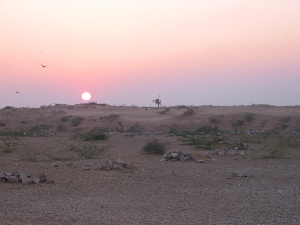 |
There aren't many places to stay near the
birds and the one we try to book with charges so much that it makes our
friend mad who is helping to make the call. Instead he offers to let us
stay with his uncle for free. No one speaks English there, so we have
some slow conversations through the phrase book. The house has great
chalk drawings on the patio.
|
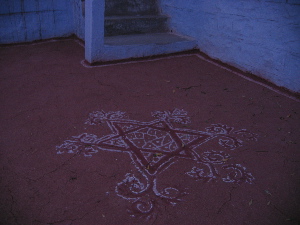 |
We stop in the town of Phalodi to eat some
fruit and wait for the day to warm up after watching the birds at
sunrise. A friendly phys ed teacher and a voting commissioner come to
stare at the bike and ask us questions. The teacher knows English and so
the voting official gets him to ask all the questions. How many children
do we have, how much money did our trip cost, what do we do, what are
American weddings like, do Americans wear clothes like they have on.
This conversation evolves gradually over 40 minutes as they step away
and discuss us, then come over with their latest question. They are
very endearing in their curiosity and warm smiles.
|
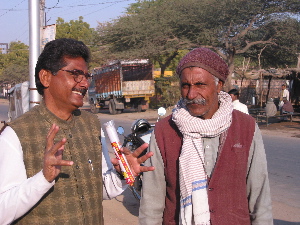 |
On the long and lonely
stretch of highway leading up to Jaisalmer, Julie logs about 250 miles
of driving time on the bike. She admirably dodges animals, construction
workers, and on-coming busses.
|
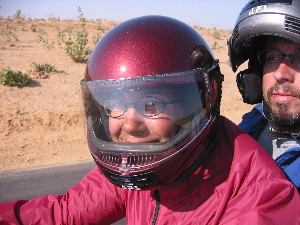 |
I discover just how boring the view is for
the passenger, and how much more painful the seat is. But it is a whole
lot warmer and more relaxing on the back seat.
|
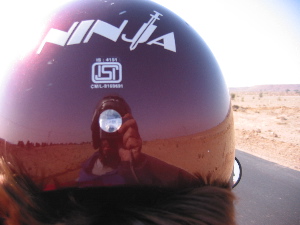 |
|
|
|
|
|
|
|
|
|
|
|
|









